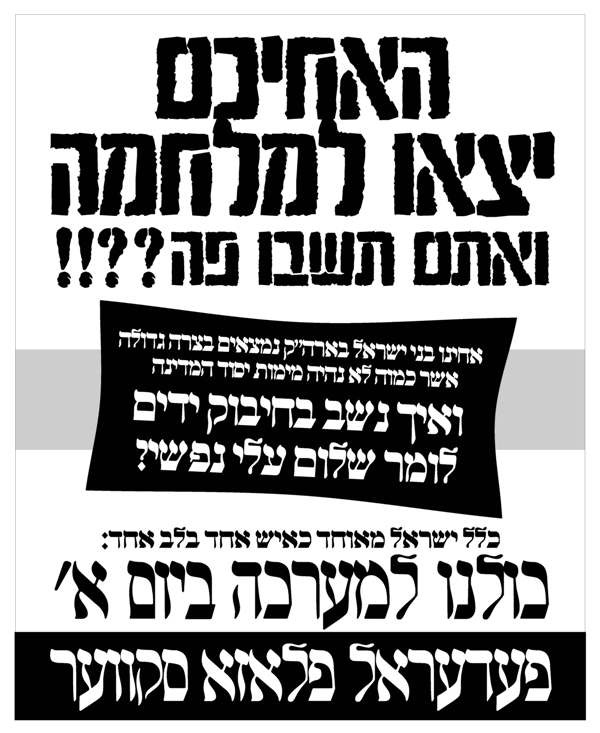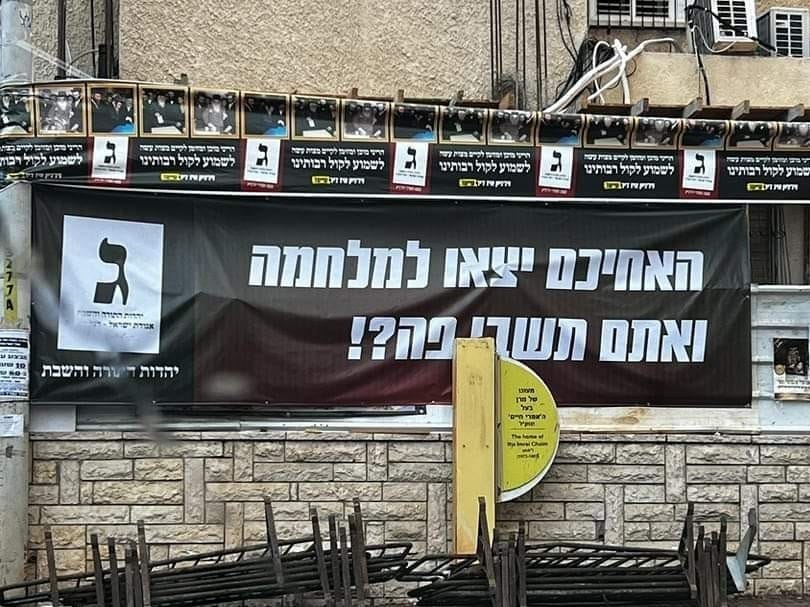The Charedi Secession from Klal Yisrael
A recent historical process reaches its tragic conclusion
Over a decade ago, Mishpacha magazine published a column by Jonathan Rosenblum in which he made a crucial observation about charedi society:
In the more than two centuries since the ghetto walls began to fall, Torah communities have often had to fight to preserve themselves. Those that followed the principle of separation from larger communal frameworks were usually the most successful in preserving their Torah identity. But that victory too came with a cost in terms of a diminished Klal Yisrael consciousness.
"Most successful at preserving their Torah identity" is not quite accurate. Rather, the separationists were the most successful in preserving certain aspects of their Torah identity, while fundamentally perverting other aspects. In my monographs on The Novelty Of Orthodoxy and The Making of Charedim (free for paid subscribers to download at the end of this post) I presented several examples of innovations and reformations that came about as a result of trying to maintain Torah identity in the face of modernity. But perhaps the most significant reformation is that which Rosenblum himself mentions: "diminished Klal Yisrael consciousness."
Klal Yisrael consciousness was traditionally a major part of what being a Jew was all about. Various mitzvos and concepts such as Ve-ahavta lereyecha kamocha, Lo ta’amod al dam reyecha, Azov taazov, Nosei b’ol, Ish echad b'lev echad, are based on the concept that one should feel a kinship with every Jew and a resultant concern for them, which means practical assistance. Every tribe in Israel had to provide people for the army, or engage in other forms of national service.
Some streams of Orthodoxy sought to maintain this Klal Yisrael consciousness, even as they created a certain degree of separation from non-Orthodox Jews. Yet the ultra-Orthodox community has not preserved this part of Torah identity. Instead, they have gradually been jettisoning it. In a post from ten years ago, “Rosenblum nails the problem with charedi society,” I discussed some examples of this. But now, of course, we are seeing the ultimate manifestation of this problem. Israel is in the middle of a long and difficult war, and the charedi community is just not part of it.
In an astonishingly revealing video, respected charedi political thinker Rivka Ravitz states that the core of being charedi is about being separate from everyone else. She further says that she doesn’t think this changed even after October 7th. She says that maybe at the very beginning there were a small number of charedim on the fringes who wanted to get involved and help, but that largely fizzled out. And, she says, as a charedi mother, she is happy about that!
Israel is at war, millions of people are part of a nation whose men are leaving their learning and jobs and families for months on end, risking (and sometimes sacrificing) life and limb in order to protect us all. But, as a matter of policy with rare exceptions, the charedi community refuses to be involved. They refuse to even help those who are involved. And they feel no sense of guilt and don’t even show any signs that they actually care. All they offer is platitudes.
The disconnect is extraordinary. When the chareidi rabbinic and political leadership talk about “the war,” they are generally referring to what they call “the war on Torah,” but which is actually the struggle to get charedim to help the nation in its hour of need - the struggle in which they are on the other side. When they talk about those who are moser nefesh and under attack, they mean yeshiva students rather than soldiers. And what about Moshe Rabbeinu’s famous call to the tribes, that they should join their brothers in war? It is repurposed as a call for charedim to join their charedi brethren in war against being part of the Jewish nation and its national defense!
All this is not merely a “diminished” Klal Yisrael consciousness - it’s a horrifying lack of one.
Traditionally, Judaism has a very harsh view of those who are poresh min hatzibbur, those who separate themselves from the Jewish community. Aruch HaShulchan discusses the case of a person who refuses to participate in paying community taxes, and rules that when such a person dies, only his relatives need busy himself with his burial - the rest of the town can carry on their affairs as normal. Since he did not share in communal responsibilities, he has seceded from the community, and even in something as significant as burial, he’s just not part of the community anymore.
And there can be more extreme cases. Rambam makes a very relevant statement:
הפורש מדרכי צבור אף על פי שלא עבר עבירות אלא נבדל מעדת ישראל ואינו עושה מצות בכללן ולא נכנס בצרתן ולא מתענה בתעניתן אלא הולך בדרכו כאחד מגויי הארץ וכאילו אינו מהן אין לו חלק לעולם הבא.
One who separates himself from the ways of the community, even if he has not transgressed any sins, but is detached from the community of Israel, does not join them for mitzvot (but instead does mitzvot privately), does not participate in their woes, does not fast when they are fasting, but goes his own way as one of the nations as though he is not part of them - he has no portion in the World to Come. (Hilchos Teshuva 3:11)
You can live a life of Torah and mitzvos and avoid aveiros and nevertheless fail as a Jew. Because being a good Jew is about much more than that. It’s about being part of the Jewish community and identifying with the challenges facing them.
Then, of course, we have the fascinating and powerful statement in the Haggadah. The wicked son does not see himself as part of the Jewish collective. And the Haggadah says “because he has excluded himself from the community, he is kofer b’ikkar - he has denied the fundamental principle.” In which ikkar has he revealed himself as a kofer? It’s not one of Rambam’s Thirteen Principles of Faith. He’s not even a kofer about the age of the universe or spontaneous generation. He’s a kofer about the ikkar that the Jewish People needs to be one nation.
All these sources describe a single person seceding from the Jewish community. In the case of charedim, we have an entire community seceding from the larger Jewish nation. Some will claim that it is therefore not relevant to the cases discussed. But others will see it as poresh min hatzibbur on an even larger and more tragic scale.
The charedi community has made it clear that they do not consider the rest of Israel to be their brothers in any meaningful sense. They have ideologically and effectively seceded from Klal Yisrael at its time of need. This is a tragic chapter in Jewish history.
Download my monographs on The Novelty of Orthodoxy and The Making of Haredim by becoming a paid subscriber.
Keep reading with a 7-day free trial
Subscribe to Rationalist Judaism to keep reading this post and get 7 days of free access to the full post archives.




